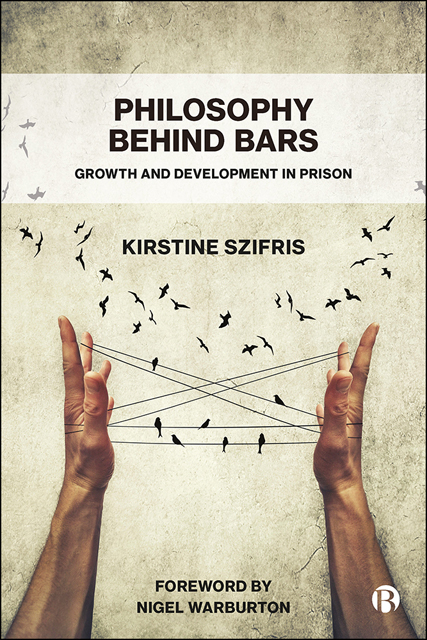Book contents
- Frontmatter
- Dedication
- Contents
- List of Boxes
- Acknowledgements
- Foreword
- 1 Philosophy, Identity and the ‘Ship of Theseus’
- 2 Towards Theory: People, Places and Voices
- 3 Survival, Plato and the Ideal Society
- 4 Kant, Bentham and the Question of Identity
- 5 ‘Why Do You Think That?’ Descartes, Hume and Knowledge>
- 6 Not Just an Offender, But a Person
- 7 Trying to Find a Community of Philosophical Inquiry
- 8 Finding Trust and Developing Relationships
- 9 Personal Self-Exploration
- 10 Towards a Framework for Understanding Philosophy in Prison
- 11 Final Reflections
- Appendix: Technical Methods
- Bibliography
- Index
11 - Final Reflections
Published online by Cambridge University Press: 15 April 2023
- Frontmatter
- Dedication
- Contents
- List of Boxes
- Acknowledgements
- Foreword
- 1 Philosophy, Identity and the ‘Ship of Theseus’
- 2 Towards Theory: People, Places and Voices
- 3 Survival, Plato and the Ideal Society
- 4 Kant, Bentham and the Question of Identity
- 5 ‘Why Do You Think That?’ Descartes, Hume and Knowledge>
- 6 Not Just an Offender, But a Person
- 7 Trying to Find a Community of Philosophical Inquiry
- 8 Finding Trust and Developing Relationships
- 9 Personal Self-Exploration
- 10 Towards a Framework for Understanding Philosophy in Prison
- 11 Final Reflections
- Appendix: Technical Methods
- Bibliography
- Index
Summary
Over the course of this research, I have found that the prisonerparticipants were deep thinkers, fully capable of intellectually challenging conversation, and with perspectives that often proved insightful. Many were earnest in their attempts to find meaning in the prison environment, and engaged in philosophical conversation with a passionate interest in self-improvement. The importance of trust, the relevance of relationships and the provision of a safe space for self-articulation in a prison environment are all present in literature on the prison experience.
Many of the participants will not be released from prison for a significant period of time. The relevance of this course is therefore about survival – survival of one's identity in the face of a complex and volatile prison culture. It is in this context that the ‘survival’ versus ‘growth’ dichotomy takes on relevance. In a prison, survival requires the opportunity to grow. Without it, in the harsh and austere prison environment, prisoners stagnate, suspended in time and space with little stimulation. Education therefore takes on a particular meaning in the prison and is, arguably, not simply desirable, but necessary.
At the outset of this project, nearly 10 years ago now, there was no literature around philosophy in prisons. I seem to have ‘caught a wave’, however, and there is now a range of philosophy courses being run and some literature has begun to emerge on the subject. However, my research remains significant and novel. As an in-depth, ethnographically led study of philosophy in prisons, I immersed myself in the context, worked closely with the participants, and considered the relevance of education through the lens of philosophical conversation. It constitutes a unique study that provides a new and important perspective on the role of prison education by drawing on the experience of researcheras-teacher, and articulating the experience of prisoners in engaging in philosophical conversation.
This research has delineated between a ‘survival’ identity and a ‘growth’ identity. At the outset of this book I related the ‘survival’ identity to Goffman's dramaturgical self. Goffman's discussions around presentations of the self postulates that a ‘frontstage’ self is performed according to the social expectations of a particular situation. The ‘backstage’ self is reserved for when the individual feels comfortable and they allow themselves to drop the ‘mask’.
- Type
- Chapter
- Information
- Philosophy behind BarsGrowth and Development in Prison, pp. 205 - 210Publisher: Bristol University PressPrint publication year: 2021

